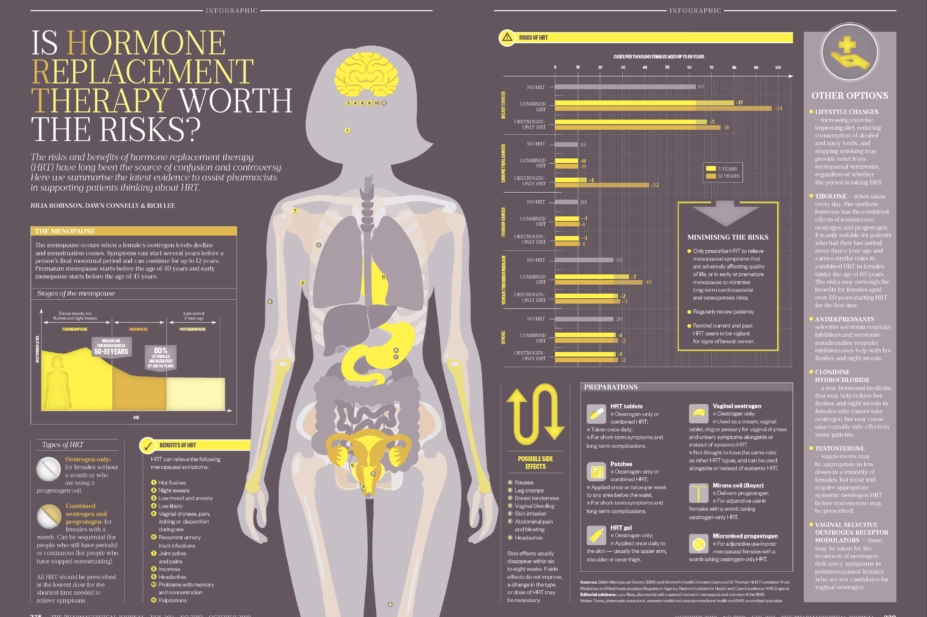
Shutterstock.com
A few years ago, I was in a cycle of extreme abdominal pain, fatigue and bloating that was seriously affecting my quality of life.
I was referred for various medical investigations: an ultrasound, blood tests, an investigative laparoscopy — but none of them found anything “of significance”.
The pain was constant and my GP suggested referring me for pain management, but I was determined to find the underlying cause.
My symptom diary revealed that my pain was worse at certain times of my menstrual cycle. I tried a combined oral contraceptive, but I felt worse than before, so I stopped. I tried the Mirena (progesterone) coil; my periods stopped, but my pain only slightly reduced.
My gynaecologist then prescribed me triptorelin, which stops the ovaries from producing oestrogen. Within a month of having my first injection, it felt like a black cloud was lifting. I was no longer in excruciating pain, I just had mild hot flushes.
Ovary removal was recommended for a more permanent solution. This was not a decision to take lightly, but, having already had two children I agreed, although I also requested a full hysterectomy. During the procedure, the surgeons found significant adhesions between my womb and bladder, along with some endometriosis — finally, I knew the reason for my pain.
One month later, I was started on oral oestrogen-only hormone replacement therapy (HRT); I did not need progesterone for endometrial protection as I no longer had a womb. However, I experienced gastrointestinal side effects, so I was transferred to a daily pump of oestrogen transdermal gel.
A surgical menopause is not like a natural one — it can feel like your hormone levels drop overnight. It felt like I had changed as a person and it took a while to adjust.
Despite my consultant’s warning, it still took me by surprise each time my symptoms changed as a result of my decreasing hormone levels. Over the next 12–18 months, my dose of oestrogen was gradually increased and this would often coincide with a period of anxiety or tearfulness, which would disappear as soon as I increased the dose. Eventually, I was on the highest strength of oestrogen patches.
However, at around 18 months, I felt flat; tests showed low testosterone, so I was prescribed testosterone gel to apply twice weekly. There isn’t currently a UK-licensed product for females, so I had to use the male formulation, which is difficult to correctly dose. Pharmacists can help make sure women know how much testosterone to apply.
At the age of 39 years, I was classed as having a ‘premature menopause’. I am fully aware that oestrogen HRT slightly increases my risk of breast cancer; however, without HRT I would be at increased risk of a cardiovascular event, bone fractures, severe menopausal symptoms and, I am certain, a reduced quality of life.
It is essential to weigh the risk of breast cancer against the benefits of HRT, in terms of symptom relief and benefits to the cardiovascular system and bone health. For me, the benefits of HRT certainly outweighed the risks. I try to balance the risk by exercising regularly, maintaining a healthy diet and weight, and keeping my alcohol intake within recommended limits.
When assessing a woman’s symptoms, the climacteric scale can help to identify them as menopausal, along with any changes to bleeding patterns. HRT should be reviewed annually — or earlier, if symptoms change — so women are always on the lowest dose that controls their symptoms. Pharmacists can counsel women on HRT supplies, advise them on any expected bleeding patterns and assess the relief of their symptoms when they return for their repeat prescription.
My experience has revealed to me the inconsistency of support women receive, as well as a lack of awareness of the different menopausal symptoms they may experience. This, along with myths around HRT, may be scaring some women away from treatment. I want to make sure all women deciding whether or not to take HRT can access the care and information they deserve.
We must recognise the symptoms of the menopause earlier and educate women on what to expect, as well as where to seek help, and where better than their local pharmacy?
Lucy Skea, specialist pharmacist in substance misuse, NHS Grampian; member, British Menopause Society
Over the past few years, Lucy Skea has shadowed her local NHS menopause clinic, joined the British Menopause Society, attended conferences and local menopause ‘cafes’, and, with the support of the Royal Pharmaceutical Society, provided educational events for local pharmacy staff.
And on 17 October 2019 — World Menopause Day — Lucy Skea led the launch of the Royal Pharmaceutical Society’s first webinar series on menopause and women’s health. Find out more at: https://www.rpharms.com/resources/webinars/menopause-and-womens-health
You may also be interested in
The importance of diverse clinical imagery within health education

Entrustable professional activities: a new approach to supervising trainee pharmacists on clinical placements
